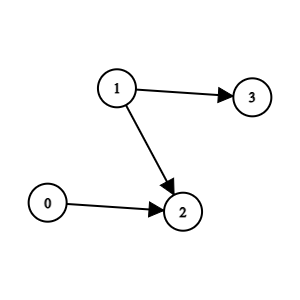Problem Description
There are n teams numbered from 0 to n - 1 in a tournament; each team is also a node in a DAG.
You are given the integer n and a 0-indexed 2D integer array edges of length m representing the DAG, where edges[i] = [ui, vi] indicates that there is a directed edge from team ui to team vi in the graph.
A directed edge from a to b in the graph means that team a is stronger than team b and team b is weaker than team a.
Team a will be the champion of the tournament if there is no team b that is stronger than team a.
Return the team that will be the champion of the tournament if there is a unique champion, otherwise, return -1.
Notes
- A cycle is a series of nodes
a1, a2, …, an, an+1such that nodea1is the same node as nodean+1, the nodesa1, a2, …, anare distinct, and there is a directed edge from the nodeaito nodeai+1for everyiin the range[1, n]. - A DAG is a directed graph that does not have any cycle.
Example 1:

Input: n = 3, edges = [[0,1],[1,2]] Output: 0 Explanation: Team 1 is weaker than team 0. Team 2 is weaker than team 1. So the champion is team 0.
Example 2:

Input: n = 4, edges = [[0,2],[1,3],[1,2]] Output: -1 Explanation: Team 2 is weaker than team 0 and team 1. Team 3 is weaker than team 1. But team 1 and team 0 are not weaker than any other teams. So the answer is -1.
Constraints:
1 <= n <= 100m == edges.length0 <= m <= n * (n - 1) / 2edges[i].length == 20 <= edge[i][j] <= n - 1edges[i][0] != edges[i][1]- The input is generated such that if team
ais stronger than teamb, teambis not stronger than teama. - The input is generated such that if team
ais stronger than teamband teambis stronger than teamc, then teamais stronger than teamc.
Difficulty: Medium
Tags: graph
Rating: 91.67%
Complexity Analysis
The solution has the following complexity characteristics:
- Time Complexity: where is the number of teams and is the number of edges
- Space Complexity: for the incoming array
Solution
Here’s my Python solution to this problem:
class Solution:
def findChampion(self, n: int, edges: List[List[int]]) -> int:
incoming = [0] * n
for start, end in edges:
incoming[end] += 1
o = []
for i, count in enumerate(incoming):
if not count:
o.append(i)
if len(o) > 1: return -1
return o[0]